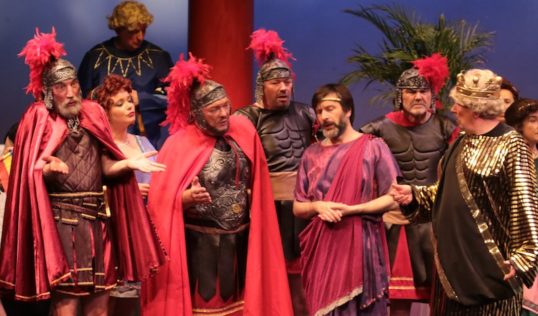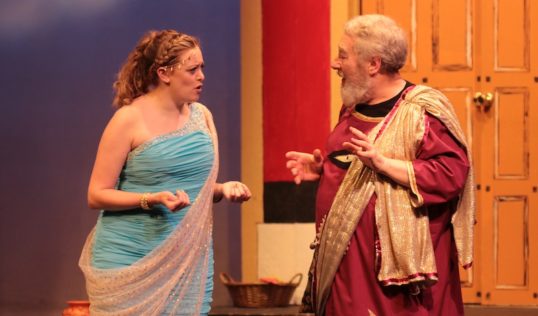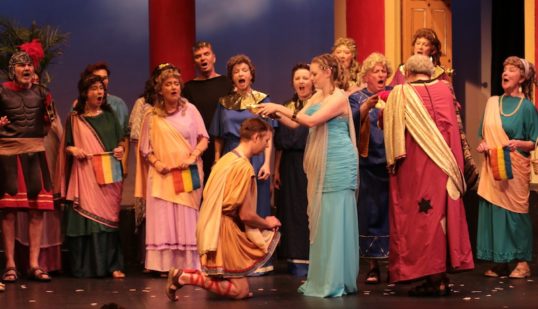La Belle Helene
★★★☆☆ Fizzing
Church Hill Theatre: Weds 11 – Sat 14 Oct 2017
Review by Thom Dibdin
Fun and flighty, Opera Camerata has ensured that they leave us wanting more, with a production of Offenbach’s La Belle Helene at the Church Hill Theatre which hits its high notes.
This, sadly, will be the last production from the local company which has been in existence since 1983, when it was founded as Sonfonia Opera before changing name in 1994. And it shows that it is not calling time for artistic reasons.
La Belle Helene is a cheeky take on the Greek myth of how Helen managed to start the Trojan wars, by running off with Paris, Prince of Troy. Her husband of the time, ancient King Menelaus of Sparta, was understandably miffed – although it was the younger (more testosterone-challenged) Greek kings who were happy for the excuse.
Offenbach starts the story with goddesses Juno, Minerva and Venus arguing over their beauty. Barbara Brodie, Katrine Townhill and Susanne Horsburgh, give the haughty trio a suitably florid introduction, before Sarah Dearne sets to with a scene setting exposition as Mercury.
Such application to the plot-driving elements of dialogue is a feature of the production. Sung in English in Phil Park’s 1964 version (with some judicious 21st century embellishments), not every line is clear – but those which are needed for comprehension certainly are.
A wandering random shepherd – who turns out to be Paris – is used to decide the issue. He, having recognised Venus goddess of love as the most beautiful, is rewarded with the promise that the most beautiful mortal woman in the world will fall in love with him.
gloriously sung
Off to Sparta, where Louise Thomson’s gloriously sung Helen is more concerned with her religious observances than being married to Mike Towers’ set-in-his-ways Menelaus. A fact which Calchas, chief auger of Sparta, is not oblivious to, as he sets about making sure that Venus’ promise comes true.

Roger Robertson (Achilles), Stuart Clelland (Ajax), Richard Mein (Agamemnon), Mike Towers (Menelaus). Pic Ross Main
George Ross has a lot more spoken lines as Calchas than sung, and ensures that the story and comedy fall out well. He’s a real busybody of a soothsayer, who you quite believe has seriously Machiavellian tendencies.
The appeal of Opera Camerata lies in its rendition of the music, not in great complicated modern sets. Indeed, the small size of the Church Hill Stage and the large size of the chorus means that the sets and staging here are pretty functional.
When Paris comes to seduce Helen and she is supposed to believe that she is dreaming his appearance and their ensuing love-making, there is no attempt to create an etherial dreamscape for her, for example. Leaving little doubt that she knows exactly what she is doing.
Thomson is a great choice as Helen. She has the haughty poise just right and her voice is more than capable of hitting the highest notes demanded of her. Menalaus is clearly out of his league – and so too is Nick Clelland’s curiously reticent Paris and there is consequently a lack of chemistry between them.
Disdain
It is in their on-stage wooing that director Elspeth Williamson misses a trick. There are plenty of little 21st century references dropped into the script, why not then reinforce Helen’s knocking back of Paris for his sense of entitlement. He already believes Helen should do all the running, and a few judicious lines and looks could have made her disdain for such an attitude a lot more obvious and crucial.
That said, there’s enough 21st gender politics to smooth this production on its way. Richard Mein, Stuart Clelland and Roger Robertson as the muscle-bound, Grecian Kings with little going on between the ears, are a good start. And Susanne Horsburgh’s delicious turn in the trousers role of Orestes continues it well.
And if the set is basic, the power of the chorus more than makes up for it, as the machinations of the gods fall in to place. So too, does the orchestra under the baton of Alison Rushworth. It is a really crisp rendition of the score, and one to savour on its own account.
The Sinfonia Opera was originally born out of the demise of the Edinburgh Opera Company, which had been on the go since 1909. Maybe, in the same way, as Opera Camarata leaves its audience wanting more, so a new small scale opera company can be born in its place.
Running time: two hours, 35 minutes (including one interval and a pause)
Church Hill Theatre 33a Morningside Road, EH10 4DR
Wednesday 11 – Saturday 14 October.
Evenings Weds-Fri: 7.30pm, Sat matinee only: 2.30pm.
Tickets: Via Usher Hall Ticketing.
ENDS




















